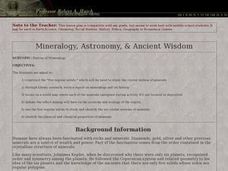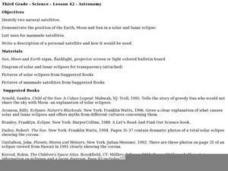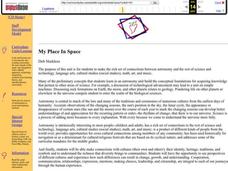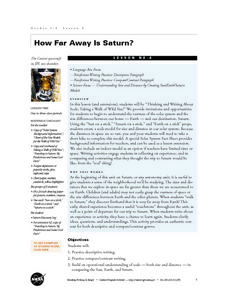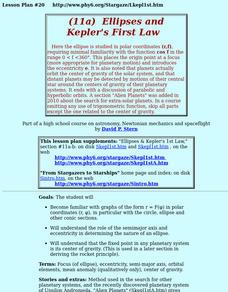Curated OER
Measuring Elevation
Students practice measuring elevation, one of the key coordinates used by astronomers. They describe how the elevation of an object is measured.
and combine compass directions and elevation to find celestial objects.
Curated OER
Three D Constellations
Students are introduced to both celestial coordinates and to the first rung on the distance determination ladder. They convert spherical coordinates to Cartesian coordinates to construct a three dimensional model of a constellation...
Curated OER
Astronomical Scales
Students describe the different units of measurement. In this space science lesson, students calculate astronomical distances using a scale. They explain the significance of using scientific notation in expressing very small or very...
Curated OER
Mineralogy, Astronomy, & Ancient Wisdom
Students complete a variety of activities surrounding minerals, crystals, and mineralogy. They locate common minerals on a world map, complete a lab in which they identify the chemical and physical properties of various minerals, etc.
Curated OER
Science - Lesson 42 - Astronomy
Third graders demonstrate the position of the Earth, Moon, and Sun in a solar and lunar eclipse. They list uses for manmade satellites and write a description of how a satellite would be use.
Curated OER
My Place In Space
The purpose of this unit is for students to make the rich set of connections between astronomy and the rest of science and technology, language arts, cultural studies (social studies), math, art, and music.
Curated OER
The Discovery of the Solar System
Pupils study the ideas behind the heliocentric theory of Copernicus. They examine about retrograde motion of the planets as they move around the sun. They study astronomers who include Ptolemy, Copernicus, and Galileo.
Curated OER
Mars Curriculum
Pupils study Mars and other plants in the night sky. In a planetarium setting using Digitarium planetarium system, students identify the Big Dipper and Polaris. They explore the major differences between the planets and the stars. ...
Curated OER
The Solar System and the Forces Behind It
Sixth graders discover why planets stay in orbit. In groups, they use everyday materials to examine the effect of gravity of objects and calculate how mass changes based on gravitational pull. To end the activity, they discuss how...
Curated OER
Introduction to Constellations
Students examine constellations. In this astronomy lesson plan, students study various constellations and identify five major constellations. They will construct a model of one of the constellations.
Curated OER
Fractions, Decimals, and Gravity
Pupils discuss how weight is directly related to gravitational force on a planet. Students then choose Space Traveler as companion and compute how much their guide weighs on various planets, based on each planet's relative surface...
Curated OER
What on Earth is Greater Than?
Students compare things that are greater than, less than, or equal to, compare the Earth to other planets, and list planets from greatest size to smallest size.
Curated OER
Kepler and his Laws
Students examine Kepler's Laws. They confirm Kepler's 3rd law by comparing orbital periods and mean distances for all major planets and study conic sections, qualitatively.
Curated OER
Using the Internet
In this using the internet learning exercise, students search several websites to review information about the heart, human senses, the solar system, and planets. Students also read information about the rock cycle and answer provided...
Curated OER
Heavens Above
Middle schoolers study the stars and their positions. In this astronomy lesson students see how scientists can predict the positions of the stars and can tell how they would have appeared in the past.
Curated OER
Exploring The Neighborhood of the Solar System
Students explain why exploring the universe for life on other planets is an important field of study. They use mathematical formulas to calculate the temperatures of planets as it relates to their distance from the sun. Students use...
Curated OER
Sky Watching
Students examine telescopes and understand how they have helped us better understand the sky. In this astronomy lesson students complete a worksheet and a lab activity.
Curated OER
Earth, Moon, Mars Balloons
Students demonstrate size and orbits of Earth, Moon, and Mars. In this space science lesson plan, students will use balloons to show how the size and distance between the planets and satellite compare.
Curated OER
How Far Away Is Saturn?
Students work together to create a scale model of the solar system. They write a descriptive paper and a paper comparing and contrasting the Earth to Saturn. They discuss their writings with the class.
Curated OER
The Discovery of the Solar System
Students explain the observed motion of the planets. The inner ones move back-and-forth across the position of the Sun, while the outer ones usually advance in one direction, but with occasional temporary reversals known as "retrograde...
Curated OER
Space Facts
Students read space facts and click on the links to research more about space objects. In this space lesson plan, students read about comets, planets, the moon, and more.
Curated OER
Ellipses And Kepler's First Law
Learners explain that planets actually orbit the center of gravity of the solar system, and that distant planets may be detected by motions of their central star around the centers of gravity of their planetary systems.
Curated OER
The Path of the Sun, the Ecliptic
High schoolers are introduced to the ecliptic, the zodiac and the apparent motions of the Sun, Moon and planets across the sky.
Curated OER
Finding the Pole Star
Students study the constellations fo the Big Dipper and Cassiopeia and their use in finding the Pole Star. They realize that other celestial objects--Sun, Moon and planets--share the rotation (and hence rise and set), even though their...





